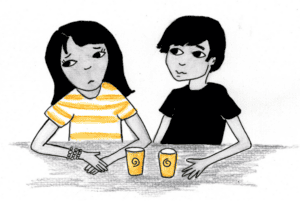What Helps What Hurts was a mental health awareness campaign developed by the Mood Disorders Association of BC (MDABC) in partnership with BC Partners for Mental Health and Addictions. The website served as a platform to educate and guide individuals on supporting friends or family members experiencing low mood or depression. The campaign ran in British Columbia, Canada, and concluded in the 2017-18 year.

Overview
The What Helps What Hurts campaign was designed to reach out to individuals, particularly in late adolescence and early adulthood, when most depression has its onset. The website provided a pocket guide and companion resources to help people understand and respond to depression without misunderstanding or causing harm.
Objectives
The main goal of What Helps What Hurts was to provide practical suggestions and tips on how to help someone with low mood or depression. It aimed to foster a supportive community where people could share their experiences and learn from others. The campaign also emphasized recognizing signs of depression and taking appropriate action.
The 4-Step Guide
WhatHelpsWhatHurts.com offered a 4-step guide to helping a friend with low mood or depression:
- Check-in with your friend: Encourage conversation without judgment.
- Listen: Take what they say seriously and show empathy.
- Encourage action: Support and help them think about solutions, including professional help.
- Follow up: Stay in touch and show continued care and support.
The guide also provided specific examples of what helps and what hurts in communication, emphasizing the importance of empathy and understanding. It’s worth noting this guide was pre-pandemic and before online therapy became popular.
Signs and Symptoms of Depression
The website listed various signs and symptoms of depression, including helplessness, loss of interest in activities, appetite or weight changes, sleep changes, anger, and more. Recognizing these signs was crucial in identifying if a friend might be dealing with depression.
When to Be Concerned
WhatHelpsWhatHurts.com stressed that a low mood lasting more than two weeks and interfering with daily life could signify depression. It guided on when and how to seek professional help, including emergency contacts for those at risk of self-harm.
Helpful Resources
The campaign encouraged users to share their stories on social media using the hashtag #whathelpswhathurts. It also directed visitors to other trusted mental health and substance use information sources, such as www.heretohelp.bc.ca.
Conclusion
WhatHelpsWhatHurts.com was a vital initiative that provided valuable resources and guidance for those seeking to support friends or family members with depression. The campaign played a significant role in mental health awareness and support by offering practical advice and fostering a community of empathy and understanding. Its legacy continues to be a reminder of the importance of compassionate communication and informed action in mental health care.
